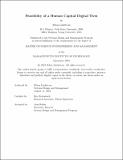Feasibility of a Human Capital Digital Twin
Author(s)
Lindstrom, Ethan
DownloadThesis PDF (1.091Mb)
Advisor
Rebentisch, Eric
Terms of use
Metadata
Show full item recordAbstract
CEOs often state that people are their most important asset, thus expressing that human capital is vital to achieving businesses’ strategic outcomes. Yet, very few would be likely to list their HR information system as a critical enabler of their business. Meanwhile, engineering disciplines have begun combining technological advances to create digital twins of important company assets, which provide unprecedented visibility into the state of these assets and can significantly improve the ability to manage them. This thesis asks if it is possible to apply those cutting-edge engineering tools (digital twins) to enhance the visibility and management of human capital. And if yes, what could such a system potentially look like?
To get there, the thesis defines the scope and objectives of a potential human capital digital twin, analyzes existing HR systems to see if they are already digital twins, and then proposes a conceptual architecture for a skills-focused human capital digital twin. The risks (both technical and sociotechnical) of implementing such a system are then evaluated and discussed.
The conclusion is that while creating a human capital digital twin appears to be possible, it is less clear if it is advisable. ’Technifying’ HR comes with significant risks that may outweigh the benefits. However, elements of the proposed system may still be worth adopting (or adapting), as there can be substantial benefits for employees and the business of taking a skills-based approach to managing human capital.
Date issued
2023-09Department
System Design and Management Program.Publisher
Massachusetts Institute of Technology